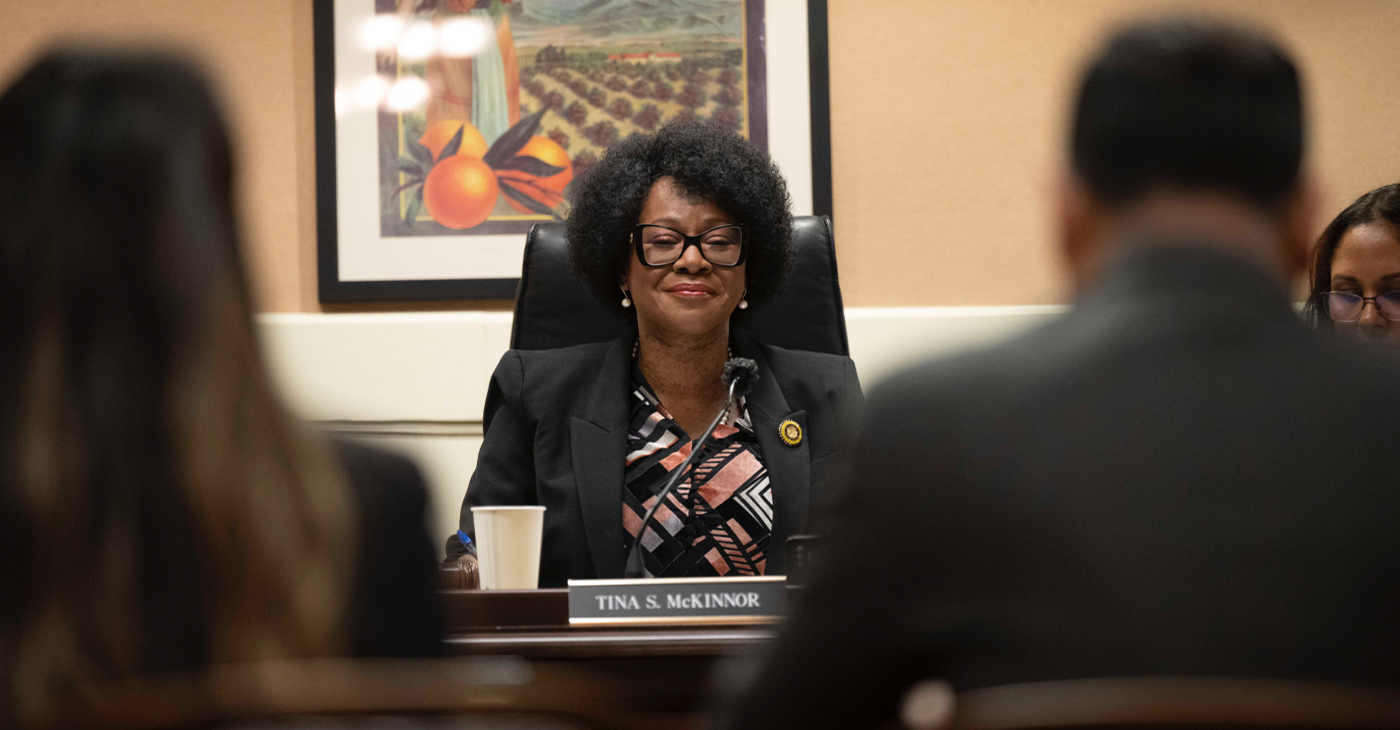California Black Media
L.A. Mayor Bass Announces L.A. Police Chief Moore’s Retirement
On Jan.12, Los Angeles Mayor Karen Bass held a press conference to announce the retirement of LAPD Chief Michel Moore, who will officially step down at the end of February. Moore will be retained on contract as a consultant during the transition to a new chief.

By California Black Media
On Jan.12, Los Angeles Mayor Karen Bass held a press conference to announce the retirement of LAPD Chief Michel Moore, who will officially step down at the end of February.
Moore will be retained on contract as a consultant during the transition to a new chief.
“I want to thank Chief Michel Moore for his more than 40 years of service to the people of Los Angeles, and for his partnership in bringing homicides and violent crime down over the last year,” said Bass at the news briefing.
Bass remained even keeled although Moore was pressured to resign by a coalition of clergy and community leaders after a Los Angeles Times investigation revealed that he ordered detectives to investigate the merit of Bass’ scholarship at USC while she was running for mayor in 2022.
“If LAPD Chief Moore has directed detectives to investigate our mayor, Mayor Karen Bass, based on a personal agenda, we are asking him to resign immediately,” said the Rev. K.W. Tulloss in December, according to an L.A. Focus report.
Tulloss, who is the Pastor of Weller Missionary Baptist Church in Los Angeles and President of the Baptist Ministers Conference added, “If he does not resign? We’re asking that the L.A. Police Commission to immediately remove him.”
At the news conference there were no signs of tensions between Bass and Moore.
“Amidst a national police-recruiting crisis, LAPD also saw more than 1,000 applicants to its academy in a single month, which is the highest number in years. I have directed the immediate launch of a nationwide search for LAPD’s next chief, which will include significant community input and consultation with law enforcement officers and experts,” said Bass. “The appointment of an interim chief will be made by the Board of Police Commissioners.”
Activism
Oakland Post: Week of April 24 – 30, 2024
The printed Weekly Edition of the Oakland Post: Week of April 24 – 30, 2024

To enlarge your view of this issue, use the slider, magnifying glass icon or full page icon in the lower right corner of the browser window. ![]()
Business
Black Business Summit Focuses on Equity, Access and Data
The California African American Chamber of Commerce hosted its second annual “State of the California African American Economy Summit,” with the aim of bolstering Black economic influence through education and fellowship. Held Jan. 24 to Jan. 25 at the Westin Los Angeles Airport Hotel, the convention brought together some of the most influential Black business leaders, policy makers and economic thinkers in the state. The discussions focused on a wide range of economic topics pertinent to California’s African American business community, including policy, government contracts, and equity, and more.

By Solomon O. Smith, California Black Media
The California African American Chamber of Commerce hosted its second annual “State of the California African American Economy Summit,” with the aim of bolstering Black economic influence through education and fellowship.
Held Jan. 24 to Jan. 25 at the Westin Los Angeles Airport Hotel, the convention brought together some of the most influential Black business leaders, policy makers and economic thinkers in the state. The discussions focused on a wide range of economic topics pertinent to California’s African American business community, including policy, government contracts, and equity, and more.
Toks Omishakin, Secretary of the California State Transportation Agency (CALSTA) was a guest at the event. He told attendees about his department’s efforts to increase access for Black business owners.
“One thing I’m taking away from this for sure is we’re going to have to do a better job of connecting through your chambers of all these opportunities of billions of dollars that are coming down the pike. I’m honestly disappointed that people don’t know, so we’ll do better,” said Omishakin.
Lueathel Seawood, the president of the African American Chamber of Commerce of San Joaquin County, expressed frustration with obtaining federal contracts for small businesses, and completing the process. She observed that once a small business was certified as DBE, a Disadvantaged Business Enterprises, there was little help getting to the next step.
Omishakin admitted there is more work to be done to help them complete the process and include them in upcoming projects. However, the high-speed rail system expansion by the California High-Speed Rail Authority has set a goal of 30% participation from small businesses — only 10 percent is set aside for DBE.
The importance of Diversity, Equity and Inclusion (DEI) in economics was reinforced during the “State of the California Economy” talk led by author and economist Julianne Malveaux, and Anthony Asadullah Samad, Executive Director of the Mervyn Dymally African American Political and Economic Institute (MDAAPEI) at California State University, Dominguez Hills.
Assaults on DEI disproportionately affect women of color and Black women, according to Malveaux. When asked what role the loss of DEI might serve in economics, she suggested a more sinister purpose.
“The genesis of all this is anti-blackness. So, your question about how this fits into the economy is economic exclusion, that essentially has been promoted as public policy,” said Malveaux.
The most anticipated speaker at the event was Janice Bryant Howroyd known affectionately to her peers as “JBH.” She is one of the first Black women to run and own a multi-billion-dollar company. Her company ActOne Group, is one of the largest, and most recognized, hiring, staffing and human resources firms in the world. She is the author of “Acting Up” and has a profile on Forbes.
Chairman of the board of directors of the California African American Chamber of Commerce, Timothy Alan Simon, a lawyer and the first Black Appointments Secretary in the Office of the Governor of California, moderated. They discussed the state of Black entrepreneurship in the country and Howroyd gave advice to other business owners.
“We look to inspire and educate,” said Howroyd. “Inspiration is great but when I’ve got people’s attention, I want to teach them something.”
California Black Media
Asm. Tina McKinnor Elected Chair of L.A. Delegation to Legislature
On Jan. 24, the members of the Los Angeles County Delegation (LACD) to the California Legislature elected Assemblymember Tina McKinnor (D-Inglewood) as the group’s chair. McKinnor, who is a member of the California Legislative Black Caucus, will lead the 39-member body, which is comprised of 15 State Senators and 24 State Assemblymembers representing various areas of Los Angeles County.

By California Black Media
On Jan. 24, the members of the Los Angeles County Delegation (LACD) to the California Legislature elected Assemblymember Tina McKinnor (D-Inglewood) as the group’s chair.
McKinnor, who is a member of the California Legislative Black Caucus, will lead the 39-member body, which is comprised of 15 State Senators and 24 State Assemblymembers representing various areas of Los Angeles County.
As LACD chair, McKinnor succeeds Assemblymember Luz Rivas (D-San Fernando Valley).
“I am grateful for the trust legislators from the Los Angeles County Delegation have placed in me to serve as its next Chair,” said McKinnor in a statement.
LACD Vice Chair, Sen. Maria Elena Durazo (D-Los Angeles), said the body, which collectively represents about 10 million people in California’s populous county, is the largest, bi-partisan, and most diverse delegation in the California Legislature.
“Heading into a challenging budget year, the Delegation, and I will be intensely focused on making sure communities throughout Los Angeles County receive the services they need and that we continue our historic investments to address homelessness and the housing affordability crisis in Los Angeles County,” Durazo added.
McKinnor thanked Rivas for her stewardship of the LACD during the last legislative session.
“The Delegation and I are grateful to outgoing Chair, Assemblymember Luz Rivas, for her incredible leadership to the Legislature, the state, and especially the people of Los Angeles County,” said McKinnor.
-

 Activism4 weeks ago
Activism4 weeks agoOakland Post: Week of March 27 – April 2, 2024
-

 #NNPA BlackPress4 weeks ago
#NNPA BlackPress4 weeks agoBeloved Actor and Activist Louis Cameron Gossett Jr. Dies at 87
-

 Community2 weeks ago
Community2 weeks agoFinancial Assistance Bill for Descendants of Enslaved Persons to Help Them Purchase, Own, or Maintain a Home
-

 Activism3 weeks ago
Activism3 weeks agoOakland Post: Week of April 3 – 6, 2024
-

 Business2 weeks ago
Business2 weeks agoV.P. Kamala Harris: Americans With Criminal Records Will Soon Be Eligible for SBA Loans
-

 Community2 weeks ago
Community2 weeks agoAG Bonta Says Oakland School Leaders Should Comply with State Laws to Avoid ‘Disparate Harm’ When Closing or Merging Schools
-

 Activism2 weeks ago
Activism2 weeks agoOakland Post: Week of April 10 – 16, 2024
-

 Community1 week ago
Community1 week agoOakland WNBA Player to be Inducted Into Hall of Fame






















































